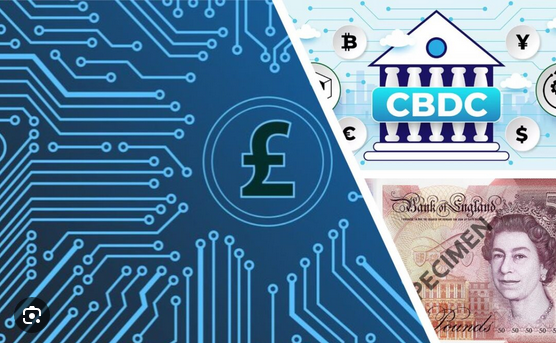We need to talk about Project Rosalind

If you’ve never heard of Project Rosalind, don’t worry, that’s how they like it. Project Rosalind is a joint initiative between the Bank for International Settlements (BIS) and the Bank of England, aiming to build the technical backbone for Central Bank Digital Currencies (CBDCs). Specifically, it's developing an API layer, that's the interface that connects central bank money to private fintech apps, wallets, and services. In plain English? It’s laying the foundations for a new kind of digital money system, where central banks issue currency, and private corporations manage how you access and use it. What could possibly go wrong?
Project Rosalind represents a dangerous consolidation of financial power, cloaked in techno-utopian language. It enables a corporate-controlled infrastructure for central bank digital currencies (CBDCs), handing private fintech giants the keys to public money access while embedding surveillance, programmability, and profit-extraction deep into the fabric of our monetary system. Far from serving the public good, Rosalind paves the way for unprecedented state and corporate control over personal transactions, undermines financial privacy, risks censorship of dissenting political activity, and entrenches digital colonialism by exporting Western-dominated payment systems to the Global South. It is a neoliberal project masquerading as innovation, absolutely bought into by banks both in the UK and in the EU.

Clearly, there are some serious red flags here. Project Rosalind isn’t some neutral tech upgrade, it’s a neoliberal power grab wrapped in code. It's a structural attack on democratic accountability, economic equality, and the very idea of money as a public good. This is why we should all be paying attention:
Project Rosalind is an exercise is digital currency with corporate control. It follows a familiar formula: privatise the service layer, retain public ownership of the 'core'. But once again, it’s the tech giants and banks who will control how people interact with their own money. Imagine public money, funded by taxes, backed by the state, being piped through apps owned by Apple, JPMorgan, or PayPal, who then extract fees, collect data, and shape your digital financial behaviour. That’s not progress. That’s financial extraction 2.0.
And this is just the tip of the iceberg. CBDCs enable programmable money: meaning the state or private actors could restrict how, when, or where money is spent. Project Rosalind’s infrastructure could facilitate this.In a country where protest laws are tightening and anti-strike rhetoric is escalating, do we trust this government, or for that matter any future one, with that kind of power? Want to donate to a radical union? Buy a book critical of the monarchy? Transfer funds to a climate activist group? This gives the Government the power to throttle activity it doesn't want, flag it, monitor who is involved in it, or outright deny it. In short, programmable money equates to programmable lives.

So can we trust Governments not to abuse it? Experience says not. This gives them surveillance capitalism on steroids should they choose to use it in that way. Every tap, swipe, and transaction under a CBDC system could be logged, analysed, and monetised. With Rosalind acting as the central API, surveillance capabilities would be baked into the architecture. This isn’t conspiracy theory, it’s the very logic behind the concept, it's the point of the system. Surveillance drives profit. Control ensures compliance.
Project Rosalind isn’t just about Britain, it about digital colonialism. It’s a blueprint for global fintech infrastructure, with BIS pushing CBDC models across the Global South.Countries desperate for IMF bailouts or international recognition will be pressured to adopt Western-built CBDC systems, entrenching digital dependence and financial colonialism under the guise of innovation. Britain, freshly 'realigned' with the EU, will play the middleman in this digital empire. And why would it grab this with both hands? Because it puts the City of London back where it was before Brexit.
Today I was pleased to see some post Brexit sense being shown. Re-aligning with the European Union sounds to me like like damage control, that mends some of the broken fences that Brexit created. There will be benefits and these will come to light as they are rolled out. That said, we need to watch what isn't going on in plain sight though. The EU itself is on a mission aggressively pursuing digital euro frameworks nearly identical to Rosalind. Let’s not forget:
- The EU’s Markets in Crypto-Assets (MiCA) regulation is pro-corporate.
- Its Digital Euro proposals favour banks and big tech.
- Its track record on democratic control of monetary policy is... not exactly worker-friendly.
If Britain re-aligns with the EU under current conditions, we’re not just aligning with European values, we’re signing up for financialisation 2.0, with Project Rosalind at its heart.

It’s not enough to reject Rosalind. We must propose a radically different digital future:
- A Publicly-Owned Payment System, run transparently and democratically.
- No private middlemen profiting from digital money access.
- Strict limits on surveillance, with court oversight.
- Worker and citizen control over digital infrastructure.
- A Digital Commons Charter, protecting the public interest in all tech infrastructure.
Technology should serve people, not profit. Given the way the world is going at the moment with the tech bro's running the show over in the States and Reform being given unlimited platforms to push their own narrative, wh need to be vocal and strangle this dystopia in the cradle.
Digital currency is no longer a question of if, but when. The global shift away from physical cash is accelerating, driven by convenience, technology, and the changing habits of consumers and businesses alike. Cash is no longer king. Digital payments now dominate everyday life, and central banks are racing to modernise currency for the digital age. But this inevitability raises urgent political questions: who controls this new form of money, how is it programmed, and what protections exist for civil liberties? Without strong democratic oversight, robust privacy safeguards, and strict limits on surveillance and programmability, digital currencies risk becoming tools of social control - enabling governments or corporations to monitor, restrict, or manipulate how people use their own money. The challenge isn’t stopping digital currency, it’s ensuring it serves the people, not power.
So whilst digital currency will happen, it should not and doesn't need to follow the model as proposed by BIS and the Bank of England. Project Rosalind is not a foregone conclusion. People need to know about it so they can mobilise against it. They named it Project Rosalind after Rosalind Franklin, the overlooked scientist behind the discovery of DNA’s structure. The irony isn't lost on those of us concerned about this. Like Franklin, the public is being sidelined, exploited for its contributions, and written out of the story. This is our call to action. As Britain inches back toward Europe, let’s not sleepwalk into a new form of algorithmic authoritarianism. Let’s demand transparency. Let’s demand democracy. Let’s build a digital economy run by and for working people. Project Rosalind is not our destiny.
It’s a choice. And we still have time to say no.
The world has gone mad. If you enjoyed reading this, please feel free to look at the rest of the blogs on www.TetleysTLDR.com. They're free to view, there's no paywall, they aren't monetised and I won't ask you to buy me a coffee. Also please free to share anything you find of interest, we only get the message out if people are aware of it. Just a leftie, standing in front of another leftie, asking to be read. All the best, Tetley

